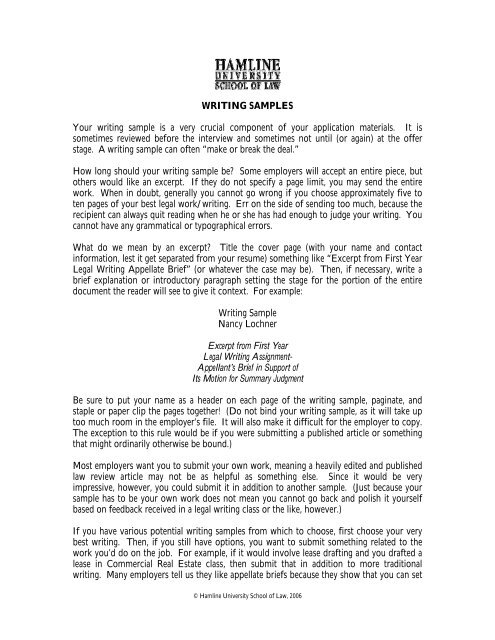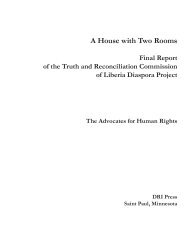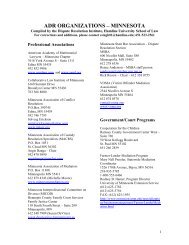WRITING SAMPLES - Hamline Law - Hamline University
WRITING SAMPLES - Hamline Law - Hamline University
WRITING SAMPLES - Hamline Law - Hamline University
You also want an ePaper? Increase the reach of your titles
YUMPU automatically turns print PDFs into web optimized ePapers that Google loves.
<strong>WRITING</strong> <strong>SAMPLES</strong><br />
Your writing sample is a very crucial component of your application materials. It is<br />
sometimes reviewed before the interview and sometimes not until (or again) at the offer<br />
stage. A writing sample can often “make or break the deal.”<br />
How long should your writing sample be? Some employers will accept an entire piece, but<br />
others would like an excerpt. If they do not specify a page limit, you may send the entire<br />
work. When in doubt, generally you cannot go wrong if you choose approximately five to<br />
ten pages of your best legal work/writing. Err on the side of sending too much, because the<br />
recipient can always quit reading when he or she has had enough to judge your writing. You<br />
cannot have any grammatical or typographical errors.<br />
What do we mean by an excerpt? Title the cover page (with your name and contact<br />
information, lest it get separated from your resume) something like “Excerpt from First Year<br />
Legal Writing Appellate Brief” (or whatever the case may be). Then, if necessary, write a<br />
brief explanation or introductory paragraph setting the stage for the portion of the entire<br />
document the reader will see to give it context. For example:<br />
Writing Sample<br />
Nancy Lochner<br />
Excerpt from First Year<br />
Legal Writing Assignment-<br />
Appellant’s Brief in Support of<br />
Its Motion for Summary Judgment<br />
Be sure to put your name as a header on each page of the writing sample, paginate, and<br />
staple or paper clip the pages together! (Do not bind your writing sample, as it will take up<br />
too much room in the employer’s file. It will also make it difficult for the employer to copy.<br />
The exception to this rule would be if you were submitting a published article or something<br />
that might ordinarily otherwise be bound.)<br />
Most employers want you to submit your own work, meaning a heavily edited and published<br />
law review article may not be as helpful as something else. Since it would be very<br />
impressive, however, you could submit it in addition to another sample. (Just because your<br />
sample has to be your own work does not mean you cannot go back and polish it yourself<br />
based on feedback received in a legal writing class or the like, however.)<br />
If you have various potential writing samples from which to choose, first choose your very<br />
best writing. Then, if you still have options, you want to submit something related to the<br />
work you’d do on the job. For example, if it would involve lease drafting and you drafted a<br />
lease in Commercial Real Estate class, then submit that in addition to more traditional<br />
writing. Many employers tell us they like appellate briefs because they show that you can set<br />
© <strong>Hamline</strong> <strong>University</strong> School of <strong>Law</strong>, 2006
forth facts objectively and you can then also advocate in the argument section. Do not<br />
submit writing that did not require research or that is based solely on policy or personalopinion-based<br />
arguments, unless that is the type of writing you would be asked to do on the<br />
job. Do not turn in any writing from pre-law-school employer unless it is legal writing.<br />
Avoid lurid subjects, if possible.<br />
You may only submit something you did at work if you redact any identifying information<br />
and have the employer’s permission (they many need the client’s permission). If it’s already<br />
a document of public record, they’re more likely to agree. After you redact the information,<br />
substitute fake information, such as Jane Doe or John Doe, for ease in reading.<br />
Make sure you review any writing samples you haven’t worked on in a while because you<br />
may be expected to discuss your sample in-depth at an interview.<br />
A REMINDER THAT YOU NEED TO PROOF - YOU CANNOT ONLY TRUST<br />
SPELL CHECK<br />
Eye halve a spelling chequer<br />
It came with my pea sea<br />
It plainly marques four my revue<br />
Miss steaks eye kin knot sea.<br />
Eye strike a key and type a word<br />
And weight four it two say<br />
Weather eye am wrong oar write<br />
It shows me strait a weigh.<br />
As soon as a mist ache is maid<br />
It nose bee fore two long<br />
And eye can put the error rite<br />
Its rarely even wrong.<br />
Eye have run this poem threw it<br />
I am shore your pleased two no<br />
Its letter perfect in it’s weigh<br />
My chequer tolled me sew.<br />
Sauce unknown<br />
AND<br />
Aoccdrnig to rscheearch at an Elingsh uinervtisy,<br />
it deosn't mttaer in waht oredr the ltteers in a wrod are,<br />
the olny ipmoertnt tihng is taht the frist and lsat ltteers are at the rghit<br />
pclae. The rset can be a toatl mses and you can sitll raed it wouthit<br />
porbelm. Tihs is bcuseae we do not raed ervey lteter by itslef but the wrod<br />
as a wlohe.<br />
© <strong>Hamline</strong> <strong>University</strong> School of <strong>Law</strong>, 2006

















